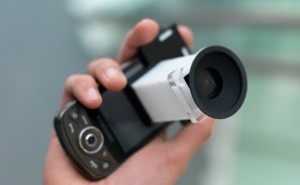 Cambridge, Massachusetts-based EyeNetra, which is developing what it calls the most affordable mobile eye diagnostic tool ever developed, recently raised $1 million of a hoped for $1.2 million round of funding. The company's peripheral device and software enables anyone to take their own eye test, get a prescription for glasses, and connect to eye-care providers right from their mobile phone. The funds come from as yet unnamed investors, but the SEC filing indicates the round of funding include two backers.
Cambridge, Massachusetts-based EyeNetra, which is developing what it calls the most affordable mobile eye diagnostic tool ever developed, recently raised $1 million of a hoped for $1.2 million round of funding. The company's peripheral device and software enables anyone to take their own eye test, get a prescription for glasses, and connect to eye-care providers right from their mobile phone. The funds come from as yet unnamed investors, but the SEC filing indicates the round of funding include two backers.
According to EyeNetra, some 2.4 billion people worldwide are in need of glasses but don't have them -- even though eyeglass makers can produce glasses for as little as $0.75 a care. The real issue is access to cost effective and quality eye diagnostics or care professionals. In addition to helping those underserved populations, EyeNetra aims to disrupt the $75 billion eyecare market.
According to an NPR report from earlier this year, the company's mobile phone peripheral device only costs about $2 to manufacture. The report explained that EyeNetra determines a patient's eye prescription like so: "The patient stares through the eyepiece and follows colored lines that appear on the screen. Software installed on the phone translates responses into a measurement of 'refractive error,' which optometrists need to make a pair of glasses." NPR notes that since the test is automatic, detractors claim the crucial, if not subjective, question of whether the patient is actually happy with the results of the prescription -- "is 1 better or 2, 1... or 2?" -- goes unanswered.
The company will use the funds to further develop its cloud-based platform, called Test2Connect, along with its group of mobile eye diagnostics, to help patients connect to care providers and vendors, including eyeglass stores, hospitals, doctors, pharmaceuticals, or others. The company's first diagnostic eye test is called NETRA-G, which is based on research conducted at the MIT Media Lab, can quickly measure near- and far-sightedness in addition to astigmatism via a mobile phone.
Future diagnostics might include a cataracts diagnostic test and retina diagnostics, according to the company.

















